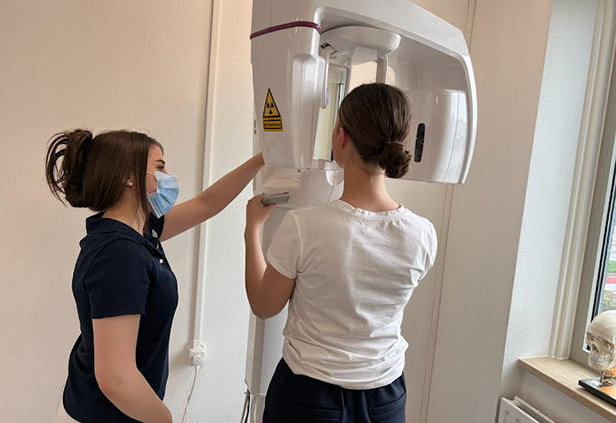
At IJssel Dental we use advanced diagnostic techniques, including x-rays, to get a clear and complete picture of your oral health. These tools allow us to detect conditions early and propose the right treatments, so that we can optimally care for your teeth.
Diagnostics is the process of examining your mouth, teeth and gums to identify any problems. This can be done manually, but we also use x-rays to see things that are not visible to the naked eye. This helps us to make a complete and accurate diagnosis.
X-rays are essential because they allow us to detect problems that are under the gums or in the jawbone, such as hidden cavities, inflammation or abnormalities in the jaw structure. By taking x-rays regularly, we can detect problems early and treat them before they become more serious or painful.
We understand that a visit to the dentist can sometimes raise questions and concerns, so we have put together this section to provide you with clear and concise answers to the most common questions.
If your question is not answered here, please do not hesitate to contact us. Our team is always ready to help you.
The frequency of x-rays depends on your individual oral health. For most people, getting x-rays every few years is sufficient, but if you have a history of dental problems, your dentist may recommend more frequent x-rays.
Yes, x-rays are safe. At IJssel Dental we use digital x-ray equipment, which minimizes the radiation dose. The amount of radiation you receive is very small and the risk of side effects is minimal.
If you are pregnant or think you may be pregnant, it is important to tell your dentist before having x-rays. In many cases, x-rays can be postponed until after pregnancy unless there is an urgent need. Your dentist will discuss this with you to make the best decision for your health and that of your baby.
X-rays can detect a variety of problems that are not visible during a regular checkup. These include hidden cavities, inflammation, abscesses, cysts, tumors, and abnormalities in the jawbone. They can also help check the position of wisdom teeth and evaluate damage after trauma.
X-rays usually do not require any special preparation. All you need to do is remove any metal objects, such as jewelry, from your head and neck to avoid interfering with the image. Your dentist will give you further instructions if necessary.
No, taking x-rays is a painless procedure. Some patients experience a little discomfort from holding the x-ray sensor in their mouth, but this only lasts a few seconds.
After taking the x-rays, your dentist will carefully review the images and discuss any abnormalities or problems with you. Based on the findings, we will create a treatment plan to optimize your oral health. We will also store these images in your file for future reference.
Monday:
Tuesday:
Wednesday:
Thursday:
Friday:
Saturday:
09:00 – 20:00
09:00 – 20:00
09:00 – 20:00
09:00 – 20:00
09:00 – 20:00
09:00 – 20:00
Dental practice IJssel Dental wishes all our patients and future patients happy holidays! 🎄✨
Due to the holidays we are closed from December 23, 2025 to January 4, 2026.
For Emergencies you can contact the Dental emergency practice Zwolle via 0900-8602This emergency practice is located on our floor.
We thank you for your understanding and will be happy to assist you again from January 5, 2026.